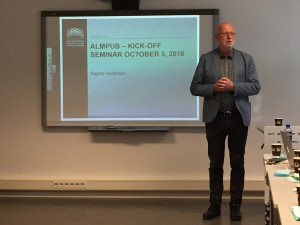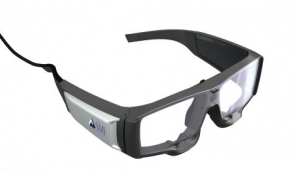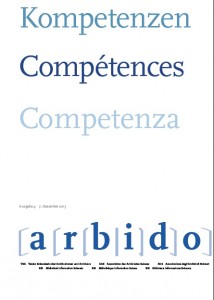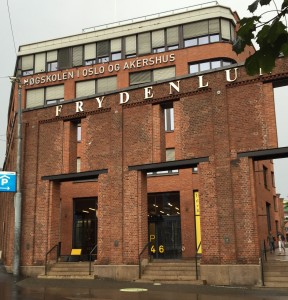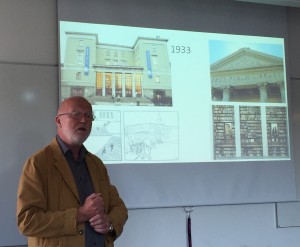Ändert die Digitalisierung die Rolle von Bibliotheken, Archiven und Museen als Garant für einen offenen und aufgeklärten Diskurs? Wie können diese Kulturinstitutionen mit ihren Ressourcen und ihren Nutzer beitragen zu einer engagierten und informierten Zivilgesellschaft? Bieten diese Institutionen im europaweiten Vergleich die Foren und Arenen, die eine aufgeklärte politische Öffentlichkeit in Zeiten des dramatischen Gesellschaftlichen Wandels benötigt? Wie sieht die Politik und die öffentliche Meinung ihre aktuelle Rolle?
Category Archives: Forschung & Projekte
Studienprojekte mit der Eye-Tracking-Brille an der FH Potsdam
Eine kleine Rückschau anlässlich unserer Aktivitäten zum Aufbau des Usability-Labors und der Informationsverhaltensforschung am Fachbereich. Viele haben dies ja schon z.B. auf dem Bremer Bibliothekartag im Rahmen der Zukunftswerkstatt oder auf anderen öffentlichen Veranstaltungen des Fachbereichs mitbekommen: wir nutzen seit 2013 ein mobiles Eye-Tracking System von SMI.
Aus anderen, „echten“ Projektmitteln konnte die recht komplexe (und vor allem teure) Eye-Tracking Brille von SMI angeschafft werden. Seitdem werden regelmäßig Masterprojekte und Masterarbeiten damit durchgeführt. Continue reading
Kompetenzen für das Digitale Zeitalter
Mein Beitrag zu einer sehr interessanten Ausgabe von a|r|b|i|d|o, dem Schweizer Journal zur Archiv-Bibliotheks-Informationswelt. Im wahren Sinn ein Blick über den Tellerrand!
Ursprünglich lediglich als Bericht aus dem Forschungsprojekt AKIB gedacht wurde es doch ein umfassenderes Statement:
Der digitale Wandel erfordert unsere Kompetenzen und bietet neue Chancen
Weitere Beiträge teilweise auf Englisch oder Französisch: zu Kompetenzmanagement allgemein (Tom Becker), zu „polykompetenten“ Informationswissenschaftlern (Andreas Kellerhals, Herbert Straub), zu Lücken in der Ausbildung (lacunes des formations initiales: Maud Jouve, Julien Benedetti), Embedded Librarians (Anne Jacobs), Archivinformatikern (Marguérite Bos), Compliance (Christian Heuking), Kanada, Niederlande u.v.a.m.
Network on Libraries in Urban Space
Our NLUS Network has had a workshop this week (24.-25.8.2015) at the Høgskolen i Oslo og Akershus. (A norwegian Fachhochschule – but what a difference to the German FHs!) The network initially called „Libraries in Urban Change“ came into light during the Potsdam conference City of Flows in 2012 where I had invited Nathalie Valet (Univ. of Antwerpen) to talk about the Strategic Footprint of Public Libraries in Urban Development. We agreed upon continuing this topic and Nathalie could publish her article delivered at the conference in the well known journal Library Management.
During the CoLIS 8 conference in Copenhagen 2013 I convinced Henrik Jochumsen, Casper Hvenegaard Rasmussen, Carl Gustav Johannsen and Dorte Skot-Hansen to join the small team which had already been enlarged by the swiss colleagues from Chur.
In 2014 the network could held a first workshop in Chur which I could not attend because of the ongoing semester. This year the date chosen luckily fell just between my annual vacation and the beginning semester.
It was nice finally meeting most of the network members in person whereas most of the business had been done via the collaboration tool Basecamp so far. We talked about the further project possibilities and we where looking for the next calls in the European Horizon2020 program. In order to prepare a joint project proposal we agreed upon a COST action program and several ERASMUS+ activities.
In fact the previous research of all of the partners joins very well together to a common theme: Ragnar Audunson (Oslo) has since several years written about the libary as a meeting place, the Copenhagen colleagues are now well known for their „Four Spaces Model“ and my research on the ROI of libraries are just different aspects of the same phenomenon.
The project initiative also fits very well into the activities at our university in Potsdam as we have just established an Institute for Urban Futures. Besides the existing Urban Complexity Lab within this institute we are also planning an Urban Transformation Lab which would very well integrate the topic of the network.
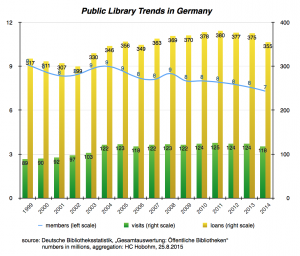 Meeting personally has at least the great advantage to talk more informally about ones own research projects and ideas as well as about the local situation of the practice field to be studied (i.e. the Public Libraries). Colleagues from the Netherlands draw an astonishing picture about the decrease of public library use there. Since I could not give the same statistics for Germany directly I quickly calculated them from the Deutsche Bibliotheksstatistik „Gesamtauswertungen„. I could not confirm the same sharp decrease of use for German Public Libraries. Only the numbers of „active users“ is in steady decline since the last century. I hope to be able to do some more calculations (and am loking forward to read a bachelor thesis on this topic just lying on my desk…)
Meeting personally has at least the great advantage to talk more informally about ones own research projects and ideas as well as about the local situation of the practice field to be studied (i.e. the Public Libraries). Colleagues from the Netherlands draw an astonishing picture about the decrease of public library use there. Since I could not give the same statistics for Germany directly I quickly calculated them from the Deutsche Bibliotheksstatistik „Gesamtauswertungen„. I could not confirm the same sharp decrease of use for German Public Libraries. Only the numbers of „active users“ is in steady decline since the last century. I hope to be able to do some more calculations (and am loking forward to read a bachelor thesis on this topic just lying on my desk…)
Travelling always gives new insights or in German: „Reisen bildet“. For more information about the NLUS network see the Weblog edited by Rudolf Mumenthaler.
Reflexion als Metakompetenz. Der Kern der hochschulischen Qualifikation der Informationsberufe
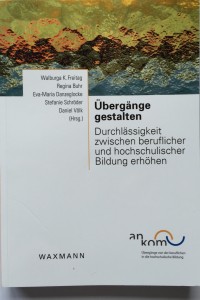 Der Abschluss-Sammelband der BMBF Förderlinie ANKOM „Übergänge von der beruflichen in die hochschulische Bildung“ ist soeben erschienen. Damit schließt sich der Kreis der Forschungen rund um die Fernweiterbildung an der FH Potsdam mit seinem theoretischen Teil und der Einbettung der Forschungsergebnisse. Unser etwas über zwei Jahre laufendes Forschungsprojekt „AKIB: Akademische Kompetenzen in den Informationsberufen“ hatte zum Ziel, die Kompetenzstruktur von Bibliothekaren und Archivaren auf Bachelor/Diplomniveau genauer zu untersuchen und vor allem im Vergleich zwischen berufsbegleitend und „direkt“ Studierenden herauszufinden, welches die Spezifika des hochschulischen Bildungsweges sind. Continue reading
Der Abschluss-Sammelband der BMBF Förderlinie ANKOM „Übergänge von der beruflichen in die hochschulische Bildung“ ist soeben erschienen. Damit schließt sich der Kreis der Forschungen rund um die Fernweiterbildung an der FH Potsdam mit seinem theoretischen Teil und der Einbettung der Forschungsergebnisse. Unser etwas über zwei Jahre laufendes Forschungsprojekt „AKIB: Akademische Kompetenzen in den Informationsberufen“ hatte zum Ziel, die Kompetenzstruktur von Bibliothekaren und Archivaren auf Bachelor/Diplomniveau genauer zu untersuchen und vor allem im Vergleich zwischen berufsbegleitend und „direkt“ Studierenden herauszufinden, welches die Spezifika des hochschulischen Bildungsweges sind. Continue reading

